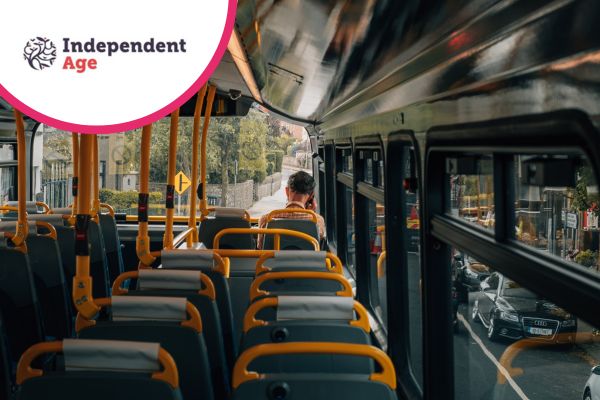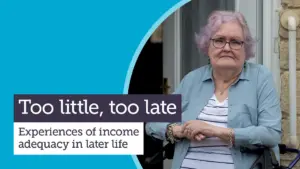
Independent Age
This help and advice was first publishing on the Indepenent Age website and the original articles can be read in full by clicking anywhere in this box.
Travel passes and discounts
Bus passes
The age when you can get an older person’s bus pass depends on where you live:
- in England, you can apply when you reach State Pension age (in London, if you are 60 or over, you are eligible for a 60+ Oyster Photocard, which gives you free travel on buses, Tube, London Overground and most National Rail services).
- in Scotland and Wales, you can apply when you are over 60.
There may be restrictions on when you can use it, such as off peak only.
You may also be entitled to free bus travel if you have a disability.
Contact your local council to find out if you qualify and how to apply.
Coach and rail discounts
If you’re over 60, you may be able to get discounted fares on coach and rail travel. You’ll need to buy a Senior Coachcard or Senior Railcard to get the reductions. Other coach operators and rail lines may have similar schemes, so make sure to check before you make travel arrangements.
You can also get reduced fares for you and a friend or family member with a Disabled Persons Railcard. You may also be able to get a Disabled Coachcard.
Help to use public transport
Travelling by train
If you need help with your bags or getting on and off trains, for example, you can book assistance by contacting Passenger Assist or the train company you’re planning to travel with. Details are on the National Rail website, which also has a ‘stations made easy’ tool, so you can check station facilities and accessibility.
If you’re travelling with a wheelchair or powered scooter, you should book a space in advance. Train companies have different policies about what they can take. Contact the relevant company for advice.
Bus and coach travel
Bus and coach drivers must give reasonable assistance to disabled people, such as helping you to get on and off a bus or coach. This doesn’t include lifting you or heavy mobility equipment. You can get more information from Gov.uk.
If you’re travelling by coach, you should ask for any help you need in advance, when you book your ticket.
Special transport schemes
Your local council may operate special transport schemes in your area, such as:
- dial-a-ride, for people who can’t use public transport
- a taxicard or taxi voucher scheme, offering reduced taxi fares for older, less mobile people
- a local volunteer drivers scheme, which can arrange lifts in cars driven by volunteers, for a small charge.
Contact your local council to find out what’s available in your area. You could also check with the Community Transport Association to see if there are any community schemes operating near you.
Free transport to day centres
Most councils and some charities have day centres where you can meet people, get a meal or join an outing. You may need to have a care needs assessment from your local council before you can start attending a day centre. Contact your local council to find out if they charge.
Hospital appointments
Your GP might recommend using hospital transport if that is the best option for your health. For subsequent visits, you’ll have to arrange this yourself at the patient transport desk in the hospital.
If you organise your own transport, you may be able to claim back the costs of travelling to hospital if you’re on Guarantee Pension Credit or qualify for the NHS Low Income Scheme. See our webpage Help with health costs for more information.
If patient transport services don’t operate in your area or you don’t qualify, you may be able to get support to attend hospital appointments from your local Royal Voluntary Service or Age UK.
Accessible holidays
Getting help to arrange a holiday
If you are receiving social care support from the council and you would find it difficult to go on holiday, ask your social worker if they can offer any help. They may be able to provide you with information about accessible holidays or about possible support to fund your break.
Charities that support people with specific conditions, such as MS Society, Parkinson’s UK, Stroke Association and Chest Heart and Stroke Scotland, may provide supported holidays or be able to help you find one.
If you need a break, ask adult social services at your local council if they can help. They may be able to provide information about suitable accommodation or arranging transport. They can also tell you about charities that can help to fund holidays for people with disabilities. See our factsheet Extra help with essential costs if you’re on a low income for more information.
Travelling abroad
When booking a holiday, be clear about what your needs are. If possible, get confirmation in writing of any assistance agreed on by a travel agency or the accommodation at your destination. You might also want to check whether your destination has:
- step-free access to all the main areas and toilets
- access to amenities such as swimming pools, bars or the beach
- charging facilities for equipment such as powered wheelchairs or scooters, and aids such as grab rails, ramps or special mattresses.
Think about the location as well – is it close to the places you want to go? If not, do you know what kind of public transport and assistance is available to help you get around? You might want to research contact details for taxi companies that can accommodate a wheelchair, for example. Remember to check that any tourist sites you want to visit are accessible.
Considerations before you travel
- Travel insurance – make sure you have the right travel insurance for your needs. Ask for advice from disability organisations and shop around for quotes. You must tell your insurance company about your condition when they ask. If you don’t, your insurance could be invalid. MoneyHelper has more information about how to find a specialist insurance broker or provider.
- Special arrangements for medication – the rules about what’s allowed vary in different countries, and you may need to check with your airline or tour operator if you’re planning to travel with medication. You should also contact your GP at least two months before you go for advice. Find more information on nhs.uk.
- Travelling with a wheelchair or other equipment – remember to:
- take any spare parts that you might need, such as tools, inner tubes, a voltage converter and adaptor
- attach instructions to your wheelchair or scooter so it can be handled properly
- keep any items that could become detached, such as cushions or parts, with you. You can travel with up to two items of mobility equipment free of charge if you’re disabled. This won’t count as part of your baggage allowance
- check the airline’s policy on any equipment that you need to take with you. Some airlines won’t take certain types of batteries or oxygen cylinders and they might have special procedures for how to pack some items.
The Association of British Travel Agents (ABTA) has a useful checklist for disabled and less mobile passengers to help you prepare for your holiday.
You can also find information and advice about accessible holidays on Tourism for All, the Rough Guide to Accessible Britain and Revitalise. You can find access reviews on websites written by and for disabled people such as AccessAble and Euan’s guide.







